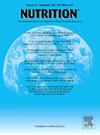绿原酸可减轻仔猪宫内生长迟缓引起的肠道损伤
IF 3.2
3区 医学
Q2 NUTRITION & DIETETICS
引用次数: 0
摘要
目的肠道疾病是宫内生长迟缓(IUGR)新生儿生长滞后、疾病抵抗力下降、围产期发病率和死亡率增加的重要因素。本试验以断奶仔猪为模型,研究绿原酸(CGA)对iugr诱导的肠道损伤的保护作用。研究方法&;试验共选取24头正常出生体重断奶仔猪和24头IUGR断奶仔猪,在26 ~ 47日龄期间分别饲喂基础饲粮或基础饲粮加1 g/kg CGA。结果scga可减轻iugr诱导的绒毛萎缩,下调紧密连接蛋白mRNA表达,降低肠道抗氧化能力、炎症反应、线粒体ATP生成和氧化代谢,改善线粒体融合和线粒体自噬相关蛋白转录表达。结论cga可能是一种潜在的营养补充剂,可减轻IUGR新生儿的肠道损伤,提高其生长和抗病性。本文章由计算机程序翻译,如有差异,请以英文原文为准。
Chlorogenic acid alleviates intrauterine growth retardation–induced intestinal damage in piglets
Objectives
Intestinal disorder is a crucial contributor to growth lag, decreased disease resistance and increased perinatal morbidity and mortality in newborns suffering from intrauterine growth retardation (IUGR). This study was conducted to investigate the protective effects of chlorogenic acid (CGA) on IUGR-induced intestinal damage using weaned piglets as a model.
Research Methods & Procedures
In total, 24 normal birth weight weaned piglets and 24 IUGR weaned piglets were fed either a basal diet or a basal diet plus 1 g/kg CGA from 26 to 47 days of age.
Results
CGA alleviated IUGR-induced villous atrophy, down-regulated tight junction protein mRNA expression, impaired antioxidant capacity, inflammatory response, impaired mitochondrial ATP production and oxidative metabolism in the intestine, and improved mitochondrial fusion and mitophagy-related protein transcriptional expression.
Conclusion
CGA may be a potential nutrient supplement in the alleviation of intestinal damage, and the improvement of growth and disease resistance in IUGR neonates.
求助全文
通过发布文献求助,成功后即可免费获取论文全文。
去求助
来源期刊

Nutrition
医学-营养学
CiteScore
7.80
自引率
2.30%
发文量
300
审稿时长
60 days
期刊介绍:
Nutrition has an open access mirror journal Nutrition: X, sharing the same aims and scope, editorial team, submission system and rigorous peer review.
Founded by Michael M. Meguid in the early 1980''s, Nutrition presents advances in nutrition research and science, informs its readers on new and advancing technologies and data in clinical nutrition practice, encourages the application of outcomes research and meta-analyses to problems in patient-related nutrition; and seeks to help clarify and set the research, policy and practice agenda for nutrition science to enhance human well-being in the years ahead.
 求助内容:
求助内容: 应助结果提醒方式:
应助结果提醒方式:


